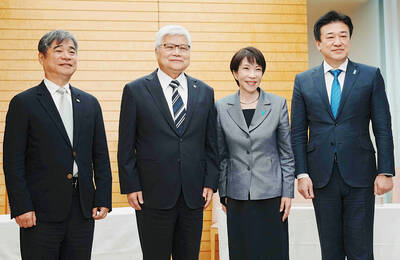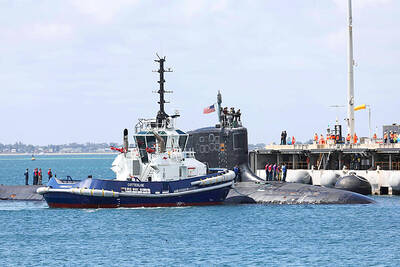Chinese authorities yesterday confirmed that 13 people had died after a bus plunged into a rushing river amid heavy flooding that has caused 15 other fatalities in the north of the nation.
State broadcaster China Central Television (CCTV) said another 37 people from the bus had been rescued, among which seven were hospitalized, and the driver had been placed in custody. One person remained missing.
The crash occurred on Monday after heavy rains caused flooding that destroyed homes and covered farmland in two provinces near Beijing.

Photo: EPA-EFE
News Web site The Paper said that the bus driver ignored warnings not to attempt to cross the bridge that was almost covered by the surging floodwater.
Video posted online showed people on top of the almost-submerged bus as water was flowing over the nearby bridge outside the Hebei Provincial capital of Shijiazhuang.
In Shanxi Province, 15 people have died in floods that have caused a direct economic loss of more than 5 billion yuan (US$775 million), CCTV reported.
More than 120,000 people had been evacuated in the province as thousands of houses collapsed and 190,000 hectares of crops were damaged.
Floods have also disrupted coal mining operations in the area amid a nationwide shortage of the fuel. The stoppage comes as the Chinese government is trying to address power shortages that have affected industry and even some homes.
Shanxi Province has also shuttered 166 tourist sites after flooding damaged a section of an ancient city wall in the historic town of Pingyao, a UNESCO World Heritage site.
Meanwhile, Hong Kong battened down yesterday evening for the second time in less than a week as Tropical Storm Kompasu prompted forecasters to raise their alert level and trigger safety measures.
It is the second major storm to threaten the territory with torrential rain and high winds in five days.
As of 5pm yesterday it was 480km south of Hong Kong packing winds of up to 110kph.
The Hong Kong Observatory issued a T8 — its third-highest storm warning — at 5:22pm.
The order stopped ferries and many bus routes from operating, although the territory’s subway system continued running.
Schools had already sent students home earlier in the day ahead of the order, with many offices following suit.
Forecasters on Saturday also declared a T8 warning when the outskirts of Tropical Storm Lionrock pounded the territory with torrential downpours and high winds.
Although the epicenter of that storm remained hundreds of kilometers to the south of Hong Kong, the T8 warning lasted for 22 hours, the longest typhoon signal since 1978, bringing about 460mm of rain over two days.
Many residents were taken by surprise at the ferocity of Lionrock, which first began battering the territory on Friday last week.
The observatory came under fire for not issuing a T8 earlier, but forecasters said the winds had not picked up to the speed where such a warning was warranted.
The facility added that storms like Lionrock were becoming harder to predict and model for, partly because of climate change.

CSBC Corp, Taiwan (台灣國際造船) yesterday released the first video documenting the submerged sea trials of Taiwan’s indigenous defense submarine prototype, the Hai Kun (海鯤), or Narwhal, showing underwater navigation and the launch of countermeasures. The footage shows the vessel’s first dive, steering and control system tests, and the raising and lowering of the periscope and antenna masts. It offered a rare look at the progress in the submarine’s sea acceptance tests. The Hai Kun carried out its first shallow-water diving trial late last month and has since completed four submerged tests, CSBC said. The newly released video compiles images recorded from Jan. 29 to

Taiwan Semiconductor Manufacturing Co (TSMC, 台積電) plans to make advanced 3-nanometer chips in Japan, stepping up its semiconductor manufacturing roadmap in the country in a triumph for Japanese Prime Minister Sanae Takaichi’s technology ambitions. TSMC is to adopt cutting-edge technology for its second wafer fab in Kumamoto, company chairman C.C. Wei (魏哲家) said yesterday. That is an upgrade from an original blueprint to produce 7-nanometer chips by late next year, people familiar with the matter said. TSMC began mass production at its first plant in Japan’s Kumamoto in late 2024. Its second fab, which is still under construction, was originally focused on

DETERRENCE EFFORTS: Washington and partners hope demonstrations of force would convince Beijing that military action against Taiwan would carry high costs The US is considering using HMAS Stirling in Western Australia as a forward base to strengthen its naval posture in a potential conflict with China, particularly over Taiwan, the Wall Street Journal reported on Saturday. As part of its Indo-Pacific strategy, Washington plans to deploy up to four nuclear-powered submarines at Stirling starting in 2027, providing a base near potential hot spots such as Taiwan and the South China Sea. The move also aims to enhance military integration with Pacific allies under the Australia-UK-US trilateral security partnership, the report said. Currently, US submarines operate from Guam, but the island could

RESTRAINTS: Should China’s actions pose any threat to Taiwan’s security, economic or social systems, China would be excluded from major financial institutions, the bill says The US House of Representatives on Monday passed the PROTECT Taiwan Act, which states that Washington would exclude China from participating in major global financial organizations if its actions directly threaten Taiwan’s security. The bill, proposed by Republican Representative Frank Lucas, passed with 395 votes in favor and two against. It stipulates that if China’s actions pose any threat to Taiwan’s security, economic or social systems, the US would, “to the maximum extent practicable,” exclude Beijing from international financial institutions, including the G20, the Bank for International Settlements and the Financial Stability Board. The bill makes it clear that China must be prepared